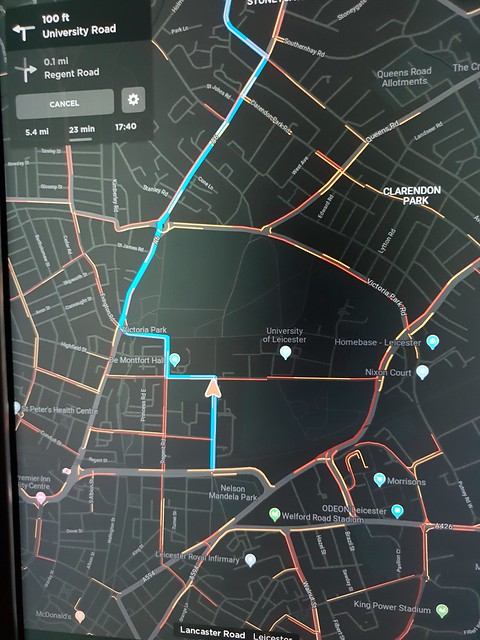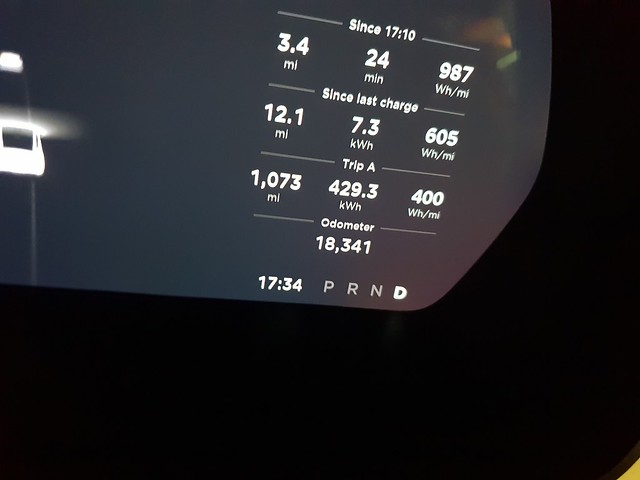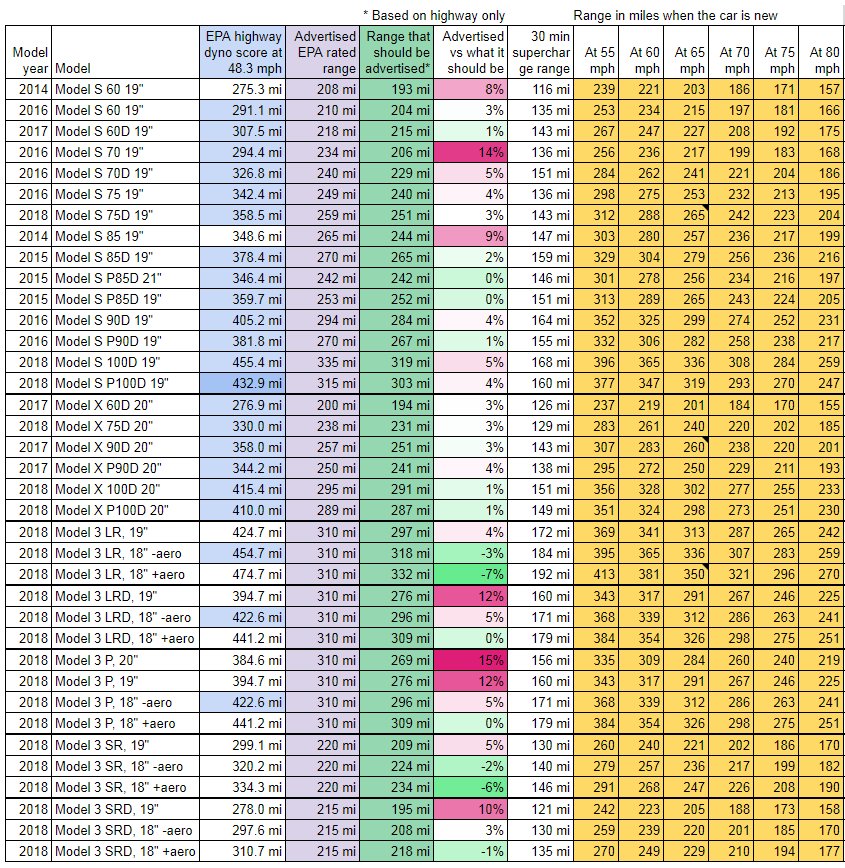Electric cars - range when thrashed
Discussion
kambites said:
That's slightly misleading though, because electric motors can operate at pretty much maximum efficiency most of the time where internal combustion engines get significantly more efficient as load increases.
er, not really, not when we are talking about making high power (ie say more than 60% throttle and 60% of peak rpm) At high loads, the mixture is enriched for component protection (avoid melting things) and the ignition retards as burn rate limits the total burn time. Added to which, as engine friction is broadly proportional to engine speed, the more you rev, the more frictional losses you get.(you are correct in saying that an ICE engine efficiency improves when the load is increased from a low load at a constant speed)
spookly said:
I was thinking that I have rarely ever seen a Tesla being driven fast, despite them being quite quick. Mostly I see them bimbling along at 60 on the motorway, I guess to conserve range.
Range versus Speed for EVs is well documented. Essentially go from 60-80mph and you can kiss 25% range goodbye, add in wind and that figure will be 30%+. 
Most of that is due to increase drag as speed picks up.

For 'spirited' driving on a B road the penalty is even higher, as constant deceleration/acceleration really kills efficiency. I did two back to back runs over a 8 mile twisty stretch. One at a 'normal' speed, and one as quickly as I dared given I was on a public road in a 2.5 ton SUV. The 'spirited' run used significant more juice - 70%+!!!

Edited by gangzoom on Tuesday 22 January 21:18
spookly said:
I'd want a all year range of at least 300 miles, or would accept a smaller range if it could be recharged *very* fast.
Wouldn't be happening for another 5 years yet, not unless you have £120K for a Tesla Roadster 2.0 when it comes out in a few years. I recon you need 150kWh usable battery packs for 300 miles of range in all conditions and 80mph, nothing on sale today comes close to that kind of capacity, our current X only has 70kWh usable - less than half of what you need for your wish list. Really depends on how fast you go and how much you use the friction brakes
On track you will be heavy on the brakes all the time so throw a lot of energy away there.
And most current EVs will limit regen and charging/power due to temperatures eventually.
Typically of you have say 80% battery and do a standing start then regen to a stop you'll recover ~70% or so of your enegy.
less if the battery is close to full/hot etc.
Bjorn recently had a group test cruising at 75mph on US motorway and the RWD model 3/ioniq came out at around 150w per km , probably a realistic ~400km range for the tesla.
On track you will be heavy on the brakes all the time so throw a lot of energy away there.
And most current EVs will limit regen and charging/power due to temperatures eventually.
Typically of you have say 80% battery and do a standing start then regen to a stop you'll recover ~70% or so of your enegy.
less if the battery is close to full/hot etc.
Bjorn recently had a group test cruising at 75mph on US motorway and the RWD model 3/ioniq came out at around 150w per km , probably a realistic ~400km range for the tesla.
DJP31 said:
The only car that could get anywhere remotely close to your 300 miles would be a Tesla. My question would be what’s your driving pattern that requires 300 miles before refuelling, and what do you mean by recharged ‘very’ fast?
During the week I mostly work from home, but will also sometimes commute a round trip of over 200 miles when seeing clients.On weekends I often go away to places in the countryside with little chance of charging a car without significant inconvenience. Ideally, I'd like to be able to go far further than 300 miles. But the most common place I pop to on the weekend is 75 miles each way, and then add on whatever driving around I do when there.
What is the energy usage on the tesla at a motorway cruise at say 95mph? In winter?
Recharged fast? I wouldn't be averse to a 20-30 minute stop every 200 miles. The bigger issue is whether the likes of chargers at motorway services can provide a charge that fast. Do they have specific tesla chargers at motorway services?
Really interesting topic, great question.
I'm a similar lead footed pistonhead who enjoys "making progress" at all times.
I enjoy driving electric vehicles but Jesus range is an issue at the moment. I sometimes drive an I3 and it's quite spectacular how the range vanishes when you press on on a lap of the TT course. It's just as well it's largely downhill from the bungalow otherwise I might not get right round.
I think it will be a few years before I buy one for myself.
PS
Anybody tried towing a fully loaded race car trailer with one yet, . Might stick to my V8 diesel for that.
. Might stick to my V8 diesel for that.
I'm a similar lead footed pistonhead who enjoys "making progress" at all times.
I enjoy driving electric vehicles but Jesus range is an issue at the moment. I sometimes drive an I3 and it's quite spectacular how the range vanishes when you press on on a lap of the TT course. It's just as well it's largely downhill from the bungalow otherwise I might not get right round.

I think it will be a few years before I buy one for myself.
PS
Anybody tried towing a fully loaded race car trailer with one yet,
 . Might stick to my V8 diesel for that.
. Might stick to my V8 diesel for that.gangzoom said:
Range versus Speed for EVs is well documented. Essentially go from 60-80mph and you can kiss 25% range goodbye, add in wind and that figure will be 30%+.

Most of that is due to increase drag as speed picks up.

For 'spirited' driving on a B road the penalty is even higher, as constant deceleration/acceleration really kills efficiency. I did two back to back runs over a 8 mile twisty stretch. One at a 'normal' speed, and one as quickly as I dared given I was on a public road in a 2.5 ton SUV. The 'spirited' run used significant more juice - 70%+!!!

Thanks. Very useful. I suspect with my driving that would see me getting well under 200 miles in ideal conditions from an 85KWh Tesla.
Most of that is due to increase drag as speed picks up.

For 'spirited' driving on a B road the penalty is even higher, as constant deceleration/acceleration really kills efficiency. I did two back to back runs over a 8 mile twisty stretch. One at a 'normal' speed, and one as quickly as I dared given I was on a public road in a 2.5 ton SUV. The 'spirited' run used significant more juice - 70%+!!!

Edited by gangzoom on Tuesday 22 January 21:18
If the motorway is clear then I don't want to drive all the way home at 60mph, 70mph, or even 80mph.
My brother lives in the Netherlands. A journey of around 550 miles, which I normally do overnight to avoid traffic. So if I went to visit in winter in something like a current model Tesla then I'd either have to drive at 60mph and factor in two stops to recharge..... or drive my normal speed and factor in four or five stops to recharge. Or hire a diesel/petrol car for the trip.... which I have done in the past anyway as the cost was cheaper than paying for fuel on a car getting 15mpg.
gangzoom said:

The hotel load (auxilary / comsumer) loads stay constant, so when graphed as watt hrs per mile, they do indeed go "up" as speed falls (fixed power, time gets longer, to total energy used increases) but for linear losses (tyres and drivetrain) which are directly proportional to speed the effect should cancel surely and leave a straight line of consumption (because a tyre or a gear go round the same number of times for a given distance irrespective of how long it takes you to travel that distance)
I am close to pulling the trigger on an EV; but I have a regular 220 mile round trip from Home to Heathrow and back each week.
That would seem to be the sweet spot but given everything I read I can see occasions where it is 0 degrees and I (like the others in this thread) am rather lead footed. This would appear to lead to <220 mile range.
Yes I could park for 20 minutes and give myself another 50-100 miles but that isn’t really what you want when you have just landed from a long haul flight; nor do I want to get there early to charge and nor do I want to leave the car in one of 6 electric bays in Heathrow T5 for 4 days; that seems a little anti-social.
So with sadness I will likely stick to the RS6 for another 2 years until we can get reliable real-world range of >250 miles no matter what. Even though it costs around 20x what an EV would in fuel for that journey!
That would seem to be the sweet spot but given everything I read I can see occasions where it is 0 degrees and I (like the others in this thread) am rather lead footed. This would appear to lead to <220 mile range.
Yes I could park for 20 minutes and give myself another 50-100 miles but that isn’t really what you want when you have just landed from a long haul flight; nor do I want to get there early to charge and nor do I want to leave the car in one of 6 electric bays in Heathrow T5 for 4 days; that seems a little anti-social.
So with sadness I will likely stick to the RS6 for another 2 years until we can get reliable real-world range of >250 miles no matter what. Even though it costs around 20x what an EV would in fuel for that journey!
Max_Torque said:
gangzoom said:

The hotel load (auxilary / comsumer) loads stay constant, so when graphed as watt hrs per mile, they do indeed go "up" as speed falls (fixed power, time gets longer, to total energy used increases) but for linear losses (tyres and drivetrain) which are directly proportional to speed the effect should cancel surely and leave a straight line of consumption (because a tyre or a gear go round the same number of times for a given distance irrespective of how long it takes you to travel that distance)
Edited by AER on Wednesday 23 January 07:30
spookly said:
Anyone know if any of the ferry companies or Eurotunnel have installed charging points for electric cars? Either on the ferry/train or in their car parks?
there are charging points at the terminal at the Eurotunnel.I have thought that charging points ON the boats or train would be a no-brainer, even if they charged a premium for their use.
feef said:
spookly said:
Anyone know if any of the ferry companies or Eurotunnel have installed charging points for electric cars? Either on the ferry/train or in their car parks?
there are charging points at the terminal at the Eurotunnel.I have thought that charging points ON the boats or train would be a no-brainer, even if they charged a premium for their use.
(would enough electrical oomph to make it worthwhile be possible?)
feef said:
I have thought that charging points ON the boats or train would be a no-brainer, even if they charged a premium for their use.
The trains, certainly since they're mains electric anyway. I doubt the ferries have the generation capacity to fast-charge a significant proportion of the cars on them so that'd be considerably more expensive to implement. Had to commute to home from the city centre today, normally I cycle but have nursery pick up to do so had to take the car. Was met by a sea of traffic when I left the work car park.

Given it was -2 outside I wacked the heater on full, and just back chilling to some tunes whilst taking my place in the rat race.
After sitting around for a while been overtaken by people on mobility scooters I thought I check the consumption....Nearly 1kWh per mile, which would equate to a range of 70 miles!!! But it would take about 10hrs to do thoses 70 miles .
.

EVs are fab, but if your doing regular long distance trips in winter, don't want to slow down or stop to recharge, and don't have access to another car hold on your cash. It might take another 5 years but ture 300 mile range EVs in winter at 70mph+ will come, but they aren't here yet.

Given it was -2 outside I wacked the heater on full, and just back chilling to some tunes whilst taking my place in the rat race.
After sitting around for a while been overtaken by people on mobility scooters I thought I check the consumption....Nearly 1kWh per mile, which would equate to a range of 70 miles!!! But it would take about 10hrs to do thoses 70 miles
 .
.
EVs are fab, but if your doing regular long distance trips in winter, don't want to slow down or stop to recharge, and don't have access to another car hold on your cash. It might take another 5 years but ture 300 mile range EVs in winter at 70mph+ will come, but they aren't here yet.
kambites said:
feef said:
I have thought that charging points ON the boats or train would be a no-brainer, even if they charged a premium for their use.
The trains, certainly since they're mains electric anyway. I doubt the ferries have the generation capacity to fast-charge a significant proportion of the cars on them so that'd be considerably more expensive to implement. On a blast around Norfolk country roads I have seen 110 miles range from a 90d. But that was taking no consideration for regen and flat out at every single opportunity.
To the chap asking about 95 mph on a cold day. I just did Schladming to Norfolk earlier this month at at -2 with a head wind trying to maintain 85 on an autobahn I could only muster 135 range I ended up having ditch my original route because the car wasn’t going to make it had to stop 9 tines on the first day. Was a total disaster.
Going 95 anywhere in a Tesla is pretty pointless because you have to stop more so you piss away everything you gained plus more.
Unless you are willing to sit there and chill at 65-70 don’t bother.
I enjoyed my trip to Austria so much in my Tesla that I’m test driving range rovers next week.
P.s if don’t need to long jounrnies regularly they are great cars!!!
To the chap asking about 95 mph on a cold day. I just did Schladming to Norfolk earlier this month at at -2 with a head wind trying to maintain 85 on an autobahn I could only muster 135 range I ended up having ditch my original route because the car wasn’t going to make it had to stop 9 tines on the first day. Was a total disaster.
Going 95 anywhere in a Tesla is pretty pointless because you have to stop more so you piss away everything you gained plus more.
Unless you are willing to sit there and chill at 65-70 don’t bother.
I enjoyed my trip to Austria so much in my Tesla that I’m test driving range rovers next week.
P.s if don’t need to long jounrnies regularly they are great cars!!!
Gassing Station | EV and Alternative Fuels | Top of Page | What's New | My Stuff




